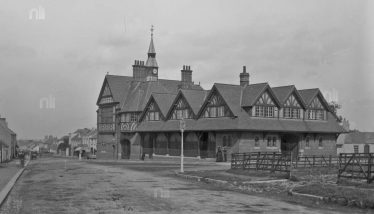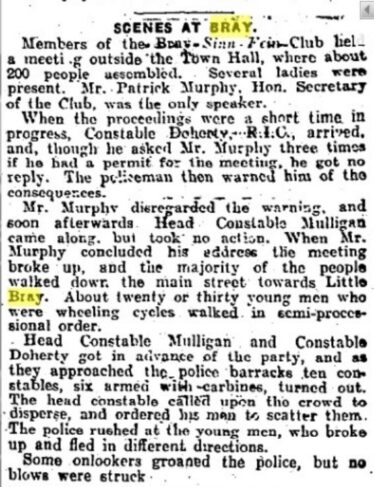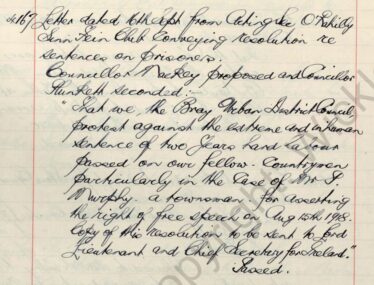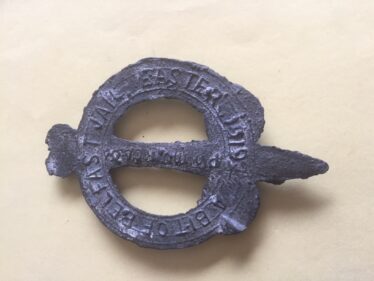Patrick Murphy: Bray Urban District Council Chairman 1921-1924





Irish volunteer Paddy or Patsy Murphy, was born in Dargan Street, Little Bray. Chairman of Bray Sinn Féin he came to prominence in 1918 when he was arrested and jailed for reading the Sinn Féin manifesto outside the Bray Town Hall.
Who was Patrick Murphy?
- Patrick A Murphy (Pádraig Ua Murchadha) 1880-1942
- Chairman of Bray Urban District Council (Brí Chualann) 1921 to 1924
- Patrick was born in February 1880 at Tillystown (Shankill, Co Dublin) to John Murphy (Coachbuilder) and Annie Gorman.
Arrest
He was released in 1919, the military authorities prohibiting any celebratory processions or meetings in the main street of Bray or vicinity. A force of about 50 extra police were drafted into the town armed with carbines, a procession formed at Shankill and proceeded without incident to the Sinn Féin club on the upper Dargle Road where speeches were delivered.
On release Murphy went into business at 52 Main Street, Bray, continuing a coach building factory, advertising his availability for work in the Bray Herald. Murphy was one of four Sinn Féin candidates elected to He won election to Bray Urban District Council in 1920. He had a keen interest in the town and well understood finance matters in council. Murphy was elected chairman in 1921 after a close contest for the position with Ratepayer councillor, George Byrne. He took the Irish name Padraig Ua Murchadha in office.
Nervous councillors
Patrick was elected Chairman of the Bray Urban council in February 1921, he took the Irish name Pádraig Ua Murchadha in office. His Dargan Street home was frequently visited by the crown forces, with his garden dug up on one occasion, on another occasion he received a notice holding him responsible for anything that might happen in Bray or district. The councillors were nervous in early 1921 after the disruption at the town hall the previous year. Some tried to rescind allegiance to Dáil Eireann but the motion did not reach a vote. The military authorities kept up the pressure on the town hall. Murphy calmly chaired his meetings, on occasion with the military patrolling around in the offices outside the chamber.
Murphy lost town clerk to Johnny McCaul, was arrested twice and kept most of 1921 in Wicklow Gaol. The council continued to defy requests from the Local Government Board for its accounts, in which matter the council followed Dáil Eireann’s guidance.
Murphy’s contribution
Dáil visit
From the point of view of republicans, some good work had been initiated in 1922 when a council deputation visited the provisional Dáil. Requests for big money for council house building were made and positions received. By July 1923 the council were discussing active proposals.
Murphy was by then being referred to the press as O’Murchadha and he furthered this move to the Irish language in September 1923 by changing the town’s name to Bri Chualainn. This move was given a luke warm reception in the council but they passed it without going to vote.




No Comments
Add a comment about this page